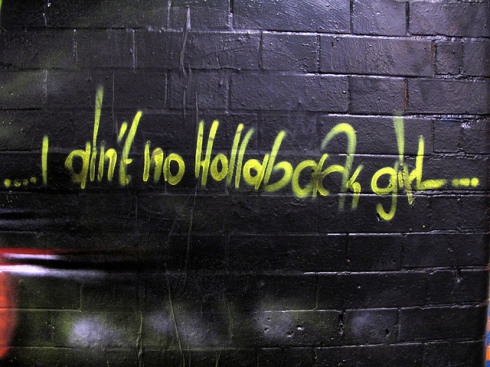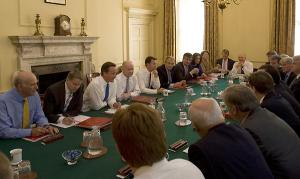
Image by duncan, shared under a Creative Commons Licence
When I was 18, I used to go to a nightclub in the city centre. I’d go there with my friends at the weekend because the drinks were stupidly cheap, the music was cheesy, and it was seen as a decent venue. The club was in the basement, and to get in you had to negotiate a very steep staircase. Every weekend, without fail, there would be a group of teenage boys lurking at the foot of the staircase, and every time a woman came down the steps, the boys would reach out and grab her backside as she walked past.
Every time me and my friends felt one of those anonymous, cowardly and unwanted hands grab at our bodies, we felt we had no choice but to accept it. We’d try to laugh it off, as shouting at them did nothing, and the bouncers were not interested in listening to us. Passing the crowd of boys at the bottom of the nightclub staircase was like a right of passage; you had to get past them in order to enter their lair, and their wandering hands were the toll for daring to climb down into their territory. We believed that we had to endure them if we wanted to go to that club. And so, endure it we did.
My experiences with sexual harassment didn’t start and end at the bottom of that staircase, instead they have grown from the actions of that gang of boys, to regular street harassment, to the man in the book shop on holiday who grabbed my breast then pressed himself against my backside as he went slid too close past me in a narrow corridor. He later tried to follow me back to my hotel. To the woman in a bar who kept trying to kiss me, despite me repeatedly pushing her away, to the man on a night out who introduced himself, shook my hand, refused to let go and told me he wanted to fuck me. I’ve experienced sexual harassment in many forms, and no matter how I experienced it, my reaction was always the same: head down, walk away, say nothing.
Whether it’s an unwanted comment, an x-rated private message, or a pair of wandering hands, sexual harassment is a betrayal, and an insidious abuse of power. An unsolicited hand on the thigh is as unwelcome as an unwanted hand on the breast, an uninvited statement is no less invasive than an unexpected and lewd instant message; they are all symptoms of the same, wider issue of sexual harassment.
In the wake of Lord Rennard’s expulsion from the Liberal Democrats amid of allegations of sexual harassment from a number of women within the party, senseless statements from his supporters, the lack of appropriate response from Nick Clegg, and Rennard’s refusal to apologise to the women involved, we must continue to spread the message that sexual harassment in any form is unacceptable, and unlike those women who were targeted by the boys at the bottom of the nightclub staircase all those years ago, we don’t have to endure it.
Michael White’s insistence that there are more pressing issues for women than “a clammy hand on the knee”, and Chris Davies’ MEP’s clumsy comparison of Rennard’s alleged behaviour to the horrific crimes of Jimmy Savile, by using words like ‘hysteria’, ‘nonsense’ and ‘out of proportion’, all their poor metaphors do is dismiss the seriousness and consequences of sexual harassment by portraying those outraged by it as people with the wrong priorities.
White and Davies may believe that they are being helpful, and that their opinion will sway public opinion, but when they dismiss this behaviour they send out the message that sexual harassment is acceptable; that it’s just one of those things in life that we must endure. Calm down, dear, don’t worry your pretty little head about this. It’s actually not that important if you really think about it. Worse things have happened. A “creepy” old man putting his hands on you without your consent isn’t a problem. Get over it.
Analogies like the ones that White and Davies spouted are overly simplistic, unsympathetic and seek to minimise the behaviour of the harasser. Most people would agree that sexual harassment has no place in modern society in 2014, but it still exists. We know that a woman can’t legally be discriminated against in the workplace in terms of pay, or if they choose to have a child, yet, tribunals handle hundreds of cases of sexual discrimination every year.
Sexual harassment is wrong, no matter who reports it or who commits it. Defending the indefensible should not be an option, and attempting to silence the whistle-blowers through inappropriate metaphor and cries for a “sense of proportion” sends victims the message that this kind of behaviour is acceptable, and that it will never change.
We cannot go through life fearing the boys who lurk at the bottom of the nightclub staircase; we have the power to target their behaviour and stop it happening. Sexual harassment does not have to be a fact of life.




